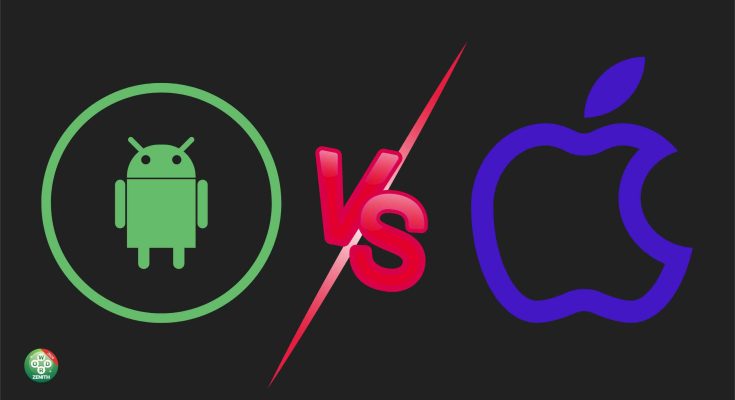The mobile gaming industry has exploded in recent years, with billions of downloads and revenue in the billions. And at the center of it all are the two major mobile platforms: Apple’s iOS and Google’s Android. These two operating systems dominate the mobile gaming landscape, each with their own strengths and weaknesses. Choosing between iOS and Android can have huge implications for gaming companies and mobile gamers alike.
A Brief History of Mobile Gaming
Mobile gaming has come a long way since the days of black and white Snake on Nokia phones. When Apple launched the App Store in 2008 with the release of the iPhone, it created a centralized marketplace for mobile apps and games for the first time. Later that year, Google released Android Market, the predecessor to Google Play.
The simplicity of buying games on a store combined with smartphone capabilities like touchscreens, accelerometers, GPS, and improved graphics opened the floodgates. Simple physics games like Angry Birds and Temple Run took the world by storm, and franchises like Candy Crush and Clash of Clans hooked millions.
And in the past few years, mobile gaming revenue surpassed console gaming for the first time. Today, mobile gaming yields over $100 billion in revenue and makes up more than half of the global games market.
iOS Versus Android: A Numbers Game
In terms of sheer market share, Android dominates. As of Q4 2021, Android accounted for around 72% of global smartphone shipments while iOS held around 28% as per Statista reports.
However, iOS still manages to pull more than its weight in mobile gaming revenue. In 2021, iOS gaming revenue totaled nearly $85 billion compared to Android’s roughly $50 billion. Part of this can be attributed to demographics—iOS users tend to be in more affluent regions and spend more on apps and in-app purchases.
When it comes to which platform gamers prefer, a 2021 survey found near equal preference, with 53% of gamers favoring iOS and 47% picking Android.
Development and Publishing Differences
For developers, publishing games on iOS and Android have some significant differences.
Apple maintains strict control over iOS and the App Store. All games must be approved and developers have to pay $99 per year to be part of the Apple Developer Program. Updates also have to be approved. On the plus side, apps are carefully curated and malware is nearly non-existent on iOS.
Publishing on Android is generally more open and affordable. There is only a one-time $25 fee to publish on Google Play and updates do not require approval. However, the downside is there is much less oversight, leading to more shoddy apps, cloning, and malware.
Discovery and visibility also vary between the stores. Apple handpicks featured games and controls what is highlighted on the App Store, giving some developers prime placement. Google Play relies more on algorithms and user metrics like reviews and downloads to highlight top games.
Gaming Capabilities: iOS’s Performance vs. Android’s Options
When it comes to gaming capabilities, iOS and Android have quite different strengths. Here’s how the platforms compare in some key areas:
- Graphics performance: Thanks to Apple’s tight integration of hardware and software, iOS games can achieve greater performance especially on recent iPhone models like the iPhone 14 Pro. However, high-end Android phones have been catching up.
- Game controllers: Native support for game controllers has been slower on iOS. The latest versions support PlayStation and Xbox controllers but Android has broader support for more controller options.
- Display capabilities: With higher screen refresh rates on many Android flagships compared to iPhones, some Android gaming can achieve higher frame rates for smoother performance. However, the iPhone 14 Pro models now also offer up to 120Hz.
- Multi-tasking: On Android, multi-tasking is easier with the ability to switch between apps. iOS is more restrictive but this allows games to tap into more of the system’s resources.
- Cloud gaming: Services like Xbox Cloud Gaming have launched on Android first, with iOS still having restrictions around streaming game services. However, this gap is closing.
Overall, iOS provides a more seamless and optimized gaming experience especially for casual games, while Android offers more versatility and customization. Hardcore mobile gamers may still prefer Android devices for added performance capabilities and configurability.
Cross-Platform Game Development
For developers who want to release games on both platforms, creating cross-platform games is critical. Some popular cross-platform game engines include Unity, Unreal Engine, Cocos2d, Marmalade, Corona SDK and more.
Making games work well across both operating systems introduces new complexity around tweaking gameplay, monetization, and graphics for each OS. There is also added work around providing controller support, different device capabilities, and OS-specific APIs.
However, if executed well, going cross-platform can allow games to tap into the strengths of both ecosystems and significantly grow their player base. Given the size of both markets, most major mobile game studios opt to go cross-platform.
The Ongoing Battle
Both Apple and Google recognize the strategic importance of gaming for their mobile platforms. Each year they make improvements to boost gaming capabilities and attract more developers.
Apple has steadily improved graphics performance with custom silicon like the A15 Bionic chip. It has also added more gaming-focused features to iOS, like Game Center—its social gaming network—and Apple Arcade—its game subscription service.
On the Android side, Google Play Instant allows games to be instantly playable without downloading the full app. Google Play Pass offers a subscription library of games. And chipsets from companies like Qualcomm and MediaTek continue advancing Android phone graphics.
Going forward, the battleground may shift more to cloud gaming. Google, Amazon, Microsoft, Nvidia, and others are pushing this technology forward. Apple’s restrictions on streaming games have caused friction, but it may relent as customer demand grows.
For now, both platforms continue to thrive. And competitive pressure between Apple and Google ultimately benefits mobile gamers through constant innovation. The last decade has shown mobile gaming is still just in its infancy, with much more potential to tap into for these tech giants.
Evaluating the Best Option
When deciding between iOS and Android for mobile gaming, consider factors like:
- The types of games you want to play (casual, hardcore, etc.)
- Budget and phone selection
- How much you want to customize your experience
- Ability to use gaming accessories
- Whether you want exclusive titles or maximum portability
Read more: Enhance Your Mobile Gaming Skills With These Simple Exercises
There’s no definitive winner—both iOS and Android deliver great gaming experiences. Apple perhaps has the edge on polish and performance while Android offers more versatility. For the ultimate experience, dedicated gaming phones like the ROG Phone 5 provide high-end specs tailored specifically for gaming.
The thriving iOS and Android gaming ecosystems ensure there are plenty of excellent mobile game options on both platforms. And healthy competition between them will drive continued innovation in the exciting world of mobile gaming. So gamers can win regardless of platform allegiance.




